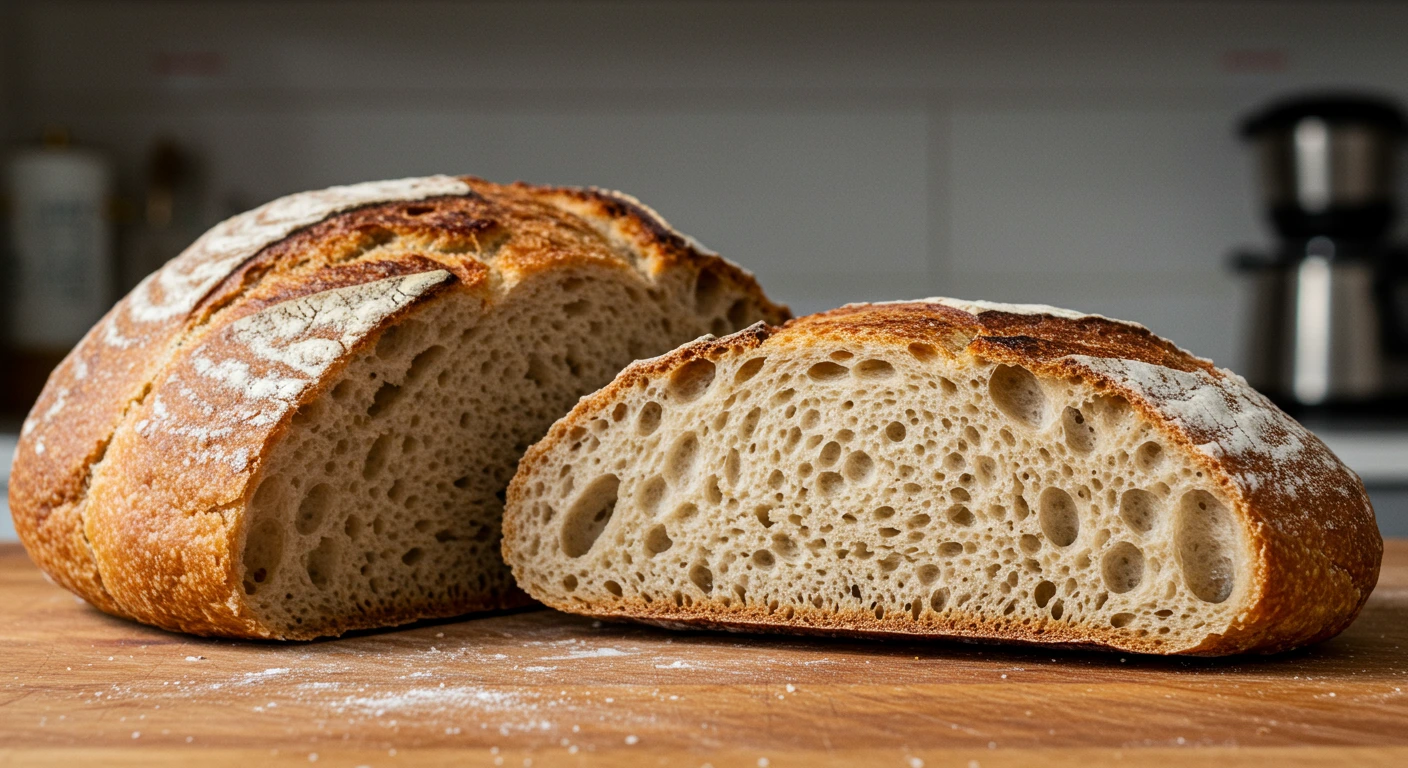Explore why naturally leavened sourdough bread may not contribute to weight gain like other breads.
The Misconception About Bread and Weight
Many people think all bread is fattening. However, this isn’t always true. The type of bread matters. Therefore, understanding the difference between breads is key. Some breads are more processed. These can lead to weight gain. Indeed, naturally leavened sourdough is different. It has unique properties that impact your body differently. The perception of bread as an enemy to weight loss is quite common. This stems from the fact that many breads are highly processed. These can lead to blood sugar spikes. However, bread is a staple food in many cultures. Moreover, it is important to understand how different types of bread affect us. Sourdough, with its ancient origins, has a different story to tell. It’s not about restricting all breads but choosing the right ones.
The Sourdough Difference
The Naturally Leavened Process
Sourdough bread uses a starter made from flour and water. Naturally occurring yeasts and bacteria ferment this mixture. This process takes time and changes the bread. It develops flavors and also changes the structure of the bread. Specifically, it makes it easier to digest. This slow fermentation also affects how the body processes the bread. This natural method of bread making is what gives sourdough its distinctive character. The wild yeasts and bacteria transform the dough. Indeed, this transformation is a slow process. It’s what gives the bread its unique tangy flavor and airy texture. This long, slow process is what makes sourdough different from most commercial breads.
Absence of Additives
Unlike many commercial breads, sourdough naturally does not use additives. It has no artificial flavors or preservatives. The ingredients are simple: flour, water, and salt. Accordingly, this makes it a cleaner food. The absence of additives means it is closer to its natural state. This can make a difference in how it affects your body. Many commercial breads contain numerous additives. These can include emulsifiers, dough conditioners, and other chemicals. Sourdough, on the other hand, relies solely on the natural fermentation process. Furthermore, this purity in ingredients makes sourdough a more appealing choice for health-conscious consumers. This can also have a positive impact on our digestive system.
Slower Digestion
Sourdough bread has a lower glycemic index. Consequently, it is digested more slowly. This means your blood sugar levels rise gradually. This can prevent spikes and crashes. A slow release of sugar can help control hunger. Furthermore, this slow digestion can promote a feeling of fullness. The glycemic index is a measure of how quickly foods cause blood sugar to rise. Sourdough’s lower glycemic index means that it releases sugar more slowly. This sustained release of energy can be beneficial for managing weight. This is because it prevents the highs and lows often seen with other types of bread. Specifically, the slower digestion aids in a more balanced metabolic response.
Why Sourdough May Not Be Fattening
Impact on Blood Sugar
The slower digestion of sourdough helps to manage blood sugar levels. Indeed, this is a big factor in weight management. Stable blood sugar levels prevent cravings. Moreover, this can help prevent overeating. Stable blood sugar also provides sustained energy. Fluctuating blood sugar levels can lead to increased hunger and cravings. This will make it hard to manage weight. Sourdough helps to keep blood sugar more even. Additionally, this can help prevent the desire to eat sugary and unhealthy snacks. The harmonious effect on blood sugar makes it a smarter choice for managing weight.
Satiety and Fullness
Sourdough can be very satisfying. It can make you feel full for longer. Therefore, this can help to reduce the urge to snack. The fiber and complex carbohydrates in sourdough contribute to the feeling of fullness. Thus, this may help with weight control. Feeling full means eating less overall. The combination of fiber and slowly digested carbohydrates provides long-lasting satiety. This means that sourdough can reduce the need for frequent snacking. Furthermore, this feeling of fullness is key for managing calories and maintaining a healthy weight. Choosing sourdough over other, less satisfying breads can help people eat less overall.
Changes to Carbohydrates
The fermentation process breaks down carbohydrates. This process makes them easier for your body to process. It reduces the glycemic load of the bread. The fermentation changes the structure of the carbohydrates. Therefore, this makes them digest more slowly. The fermentation process creates enzymes. These enzymes break down the carbohydrates into simpler molecules. This change in structure means they’re digested more slowly. Indeed, this slow digestion helps to prevent a rapid spike in blood sugar. The resulting carbohydrates are more easily processed by the body.
Improved Gut Health
Sourdough may contribute to better gut health. The fermentation promotes good bacteria in the gut. A healthy gut is important for weight control. Generally, a healthy gut will help to process food. This will also help to manage weight more easily. Sourdough acts as a prebiotic. This means it feeds the good bacteria in your gut. A healthy gut is important for many reasons. Moreover, it can play a role in weight management. The good bacteria in the gut helps to digest food and absorb nutrients. A balanced gut will also help control bloating and digestive issues.
Comparing Sourdough to Other Breads
White Bread
White bread is often highly processed. It also has a high glycemic index. Comparatively, it digests quickly and causes blood sugar spikes. These can lead to weight gain. Consequently, white bread has fewer nutrients and fiber. This is what makes it less satisfying. White bread is often stripped of its natural fiber and bran. This will result in a higher glycemic index. Specifically, this rapid rise in blood sugar can contribute to weight gain. White bread provides little fiber. This is what contributes to feeling less satisfying. It can also lead to increased hunger and overeating.
Whole Wheat Bread
Whole wheat bread is better than white bread. However, it may still not have all the benefits of sourdough. Specifically, some whole wheat bread is still processed. The fermentation in sourdough offers added benefits. Indeed, naturally leavened sourdough has unique characteristics. While whole wheat bread has more fiber and nutrients than white bread. Many commercially made versions are still processed. Furthermore, this processing can diminish some of their benefits. Sourdough’s fermentation process gives it additional health benefits. This goes beyond what you can achieve with whole wheat bread.
Other Processed Breads
Many commercial breads have added sugars and fats. They may also contain additives and preservatives. Altogether, these additives can lead to weight gain. Furthermore, these breads are often very low in nutrients. These are much less helpful to your body. Many processed breads contain a lot of sugar and fat. This will make them high-calorie and very satisfying. These additives can also have negative impacts on our health. Specifically, they can contribute to weight gain. Choosing naturally made sourdough bread is a much better option.
How to Enjoy Sourdough in a Healthy Way
Portion Control
Even though sourdough has benefits, portion control is still important. Therefore, enjoy it in moderation. A small piece with a meal is a great option. Explicitly, be mindful of your overall intake. Even healthy foods can lead to weight gain if eaten in excessive amounts. Therefore, it is important to keep portions moderate. A small serving of sourdough can complement a meal. This will provide you with a good source of carbohydrates. It will also give you the satisfying effects.
Pair with Proteins and Vegetables
Combine sourdough with proteins and vegetables. This can help balance your meal. Specifically, include a salad with some chicken or eggs. Afterward, you will create a satisfying and nutritious meal. Pairing sourdough with proteins and vegetables adds nutrients. It also adds fiber, and healthy fats. This combination can help balance your blood sugar. It will also help make you feel fuller. Indeed, this is a better approach compared to eating bread by itself.
Choose Naturally Made Sourdough
Choose naturally made sourdough without additives. Look for breads with simple ingredients. This will ensure that you are getting the full benefits of sourdough. Another thing to look for is a long fermentation process. Naturally made sourdough will have simple, recognizable ingredients. This will often include flour, water, and salt. Look for breads that have a long fermentation time. This will mean they have better flavor and health benefits. Choosing naturally made sourdough helps you get the most out of your choice.
Understanding the Science
The Role of Lactic Acid
The fermentation in sourdough produces lactic acid. This acid helps to break down carbohydrates. It also reduces the glycemic load. Lactic acid also creates the tangy flavor. Moreover, it plays an important part in the digestive process. Lactic acid is a byproduct of the fermentation process. It is what gives sourdough its unique tang. Furthermore, it plays a part in breaking down carbohydrates. This will also make them easier to digest. This acid has a big part in changing the characteristics of the bread.
Impact on Gluten
The long fermentation in sourdough also breaks down the gluten. This can make it easier for some people to digest. This is particularly true for those who may have a mild intolerance. Generally, this change in gluten makes it easier on the body. The long fermentation process breaks down gluten proteins. This makes it easier for the body to process. People who have a sensitivity to gluten may find sourdough bread more compatible. This does not mean it is gluten-free, however, it makes it easier for most.
Prebiotic Properties
Sourdough acts as a prebiotic. This is because it feeds good bacteria in the gut. A healthy gut is important for weight management. Therefore, this prebiotic effect is another potential benefit. This action is from the fiber and the fermented carbohydrates. Sourdough is a source of prebiotics. These feed the good bacteria in your gut. A healthy gut is linked to many health benefits. Specifically, these benefits can include better weight management. This will be from better digestion and nutrient absorption.
Practical Tips for Sourdough
Making Your Own Starter
Making your own sourdough starter is easy and simple. It allows you to control the ingredients. Furthermore, it’s a very rewarding experience. You can be sure your bread is truly naturally made. Indeed, a homemade starter gives you more control. Making your own starter allows you full control over what goes into your bread. It allows you to choose your flour and water. It can be a very satisfying and fulfilling process. Moreover, it connects you to the traditional bread-making process.
Choosing the Right Flour
The type of flour you use can make a difference. Whole grain flours offer more fiber. Therefore, they can be more satisfying. Experiment with different flours for flavor and texture. However, ensure to start simple. The flour you use greatly impacts the bread’s flavor and texture. Whole grain flours offer more fiber and nutrients. Specifically, they can also make you feel fuller. Accordingly, experimenting with different types of flour can be a great experience.
Baking at Home
Baking sourdough at home is a great way to ensure quality. It also allows you to choose the right ingredients. This also allows you to choose how your bread is made. Thus, baking at home allows for full control. Baking at home lets you control all aspects of the process. From the ingredients to the baking time. This gives you full freedom to create your best bread. Finally, it can be very therapeutic.
Frequently Asked Questions (FAQs)
Is sourdough bread better for weight loss?
Sourdough bread’s lower glycemic index and the fermentation process can help with satiety and blood sugar control, potentially supporting weight management.
Why is sourdough bread easier to digest?
The fermentation process breaks down gluten and carbohydrates, making sourdough bread easier for some people to digest compared to other breads.
Does sourdough bread have fewer calories?
Sourdough bread doesn’t necessarily have fewer calories, but its impact on blood sugar and satiety can be beneficial for those watching their weight.
Can I eat sourdough bread every day?
Yes, you can eat sourdough bread daily as part of a balanced diet. Just be mindful of portion sizes and choose naturally made varieties.
Conclusion
Naturally leavened sourdough bread may not contribute to weight gain as much as other types of bread. The slower digestion, increased satiety, and changes to carbohydrates make it a better option. Enjoy sourdough as part of a balanced diet for the best benefits. Finally, choosing naturally made bread is a key to good health. Ultimately, when eaten mindfully, sourdough can be a very good part of your diet. The unique benefits of sourdough mean that it is not only delicious but also good for you. The fermentation process provides benefits you simply can’t find in other breads. Therefore, when you choose sourdough, you choose both a better bread and a better life. Ultimately, when eaten with a balanced meal, it can be a wonderful part of your healthy diet.
Enjoy your baking journey!



